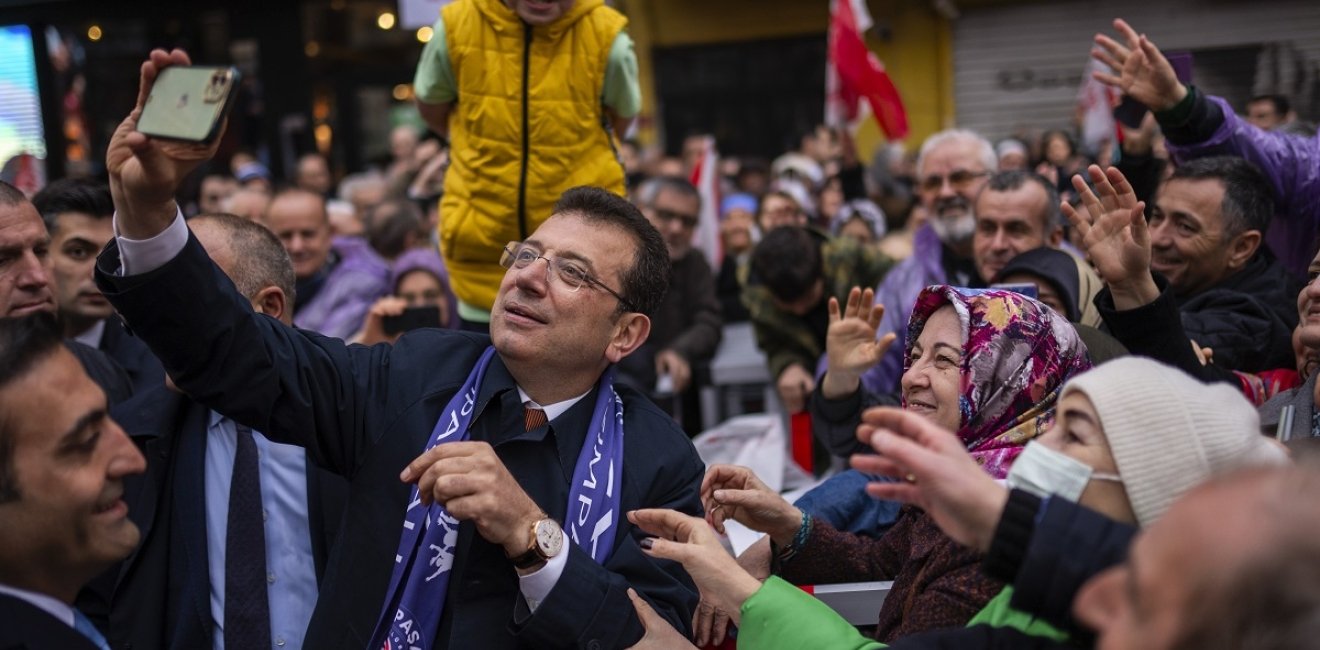The Turkish local elections on March 31 were a real game-changer. The Justice and Development Party (AKP), led by President Recep Tayyip Erdogan, did not put up a credible challenge to Republican People's Party (CHP) candidates in cities like Istanbul and Ankara and came second in total overall votes. The CHP not only came first—a feat not achieved since the 1977 general elections—but also secured a victory in almost all major cities in Turkey, including a province it had not won since 1946. Overall, the elections brought fresh energy to the opposition, positioning Istanbul mayor Ekrem Imamoglu at the center of Turkish politics.
In stark contrast to the pervasive disillusionment that characterized last year's May 14 presidential elections—where a profound sense of apathy, particularly among the youth, prevailed— the local elections somewhat mitigated that wave of despair for the moment.
Election night
It was a surprising night for many. The CHP won in 36 out of Turkey's 81 municipalities, making significant inroads into many of Erdogan's strongholds. It garnered 38% of the national vote, slightly edging out the president's party at 35%, marking the CHP's most substantial electoral triumph since Erdogan's ascent to power over two decades ago.
Turkey's recent economic troubles played a big part, tipping the scales in favor of the opposition.
Several factors contributed to this political shift. Turkey's recent economic troubles played a big part, tipping the scales in favor of the opposition. The country has been wrestling with serious financial issues since 2018, such as skyrocketing inflation and a lack of foreign currency reserves. These problems, in addition to the Erdogan government’s austerity measures, have hit the wallets of ordinary people hard and sparked a lot of frustration with the government's approach to the economy.
The opposition jumped on this dissatisfaction. They criticized Erdogan's handling of the economy and promised to bring more transparency and effectiveness to public spending and local governance. Istanbul's Imamoglu had been implementing several policies, such as establishing restaurants that provide cheap yet quality food, distributing subsidized milk to school children, and providing free public transportation for mothers with children under 4 to bring relief to those battered by the harsh economic conditions.
As for the CHP, the overhaul in its leadership in November was pivotal. The election of new CHP leader Ozgur Ozel, alongside the opposition's key figure Ekrem Imamoglu and their respective teams, infused a fresh dynamism and direction, resonating deeply with voters.
Despite the element of surprise for many, including observers from the international community, the mood at CHP headquarters on the evening of the election was distinctly upbeat. Nezih Onur Kuru, Director of the Research Department at the CHP Electoral Strategy Office, said, "The CHP undertook thorough preparations for this election, devising a strategy anchored in solid data gathered from various districts throughout Turkey." In Istanbul, according to Kuru, the collaboration with the DEM Party via an informal coalition was instrumental in amplifying Imamoglu's vote tally while simultaneously securing additional seats for the CHP in the municipal council.
In essence, Kuru emphasized that the election outcomes were anticipated by those within the CHP headquarters, given the continuous polling throughout the campaign period. The new leadership underscored the CHP's commitment to transformation and readiness to govern, culminating in a significant triumph. However, the CHP wasn't the only winner of the election night.
New party prospects
The rise of the New Welfare Party (YRP), a new, far-right Islamist party, significantly impacted the elections by attracting disillusioned AKP supporters unhappy with the government's economic policies as well as Turkey's ongoing trade with Israel. The YRP's emergence as a formidable force, despite significant pressure from Erdogan to align with AKP, effectively siphoned a substantial portion of votes away from AKP.
The Peoples' Equality and Democracy Party (DEM Party), successor to the pro-Kurdish People’s Democratic Party (HDP), successfully reversed its declining voter support since the 2015 elections. This success contrasts with the failure of the AKP-led governance, which relied on trustee-based politics. Despite attempts to criminalize the DEM Party, Kurdish opposition remains vibrant. The DEM Party's performance in local elections, winning in 12 municipalities and increasing votes in others, demonstrates dissatisfaction with trustee politics among Kurds.
A significant portion of the supporters of the ruling AKP-MHP coalition did not vote, likely in protest. Despite increasing voter registration, the same amount of people voted as in previous elections, indicating a lack of enthusiasm for this round. The decrease in turnout suggests potential dissatisfaction among AKP voters, primarily attributed to ongoing economic and political crises.
For Erdogan, the elections spelled a stark reversal of fortune, marking the first time AKP fell to the second spot since its foundation. This outcome is a significant blow to the AKP's image, relegating it to Turkey's second party.
The Imamoglu effect
Istanbul and its districts were particularly significant in this election. The acquisition of the city council by the CHP will remove obstacles for Ekrem Imamoglu, paving the way for new projects and potentially more effective governance compared to the previous five years, wherein AKP councilmembers blocked numerous policies such as the procurement of new taxis for the city.
Since a significant portion (26 out of 39) of Istanbul's districts are now under CHP control, impactful projects in the metropolitan area have become feasible. The economic challenges highlight how crucial local governance is, especially since local authorities are key in delivering basic services and fostering economic opportunities.
The long-term effects of the elections on the political landscape are yet to unfold, yet it seems tougher days are ahead for Erdogan and his AKP. Imamoglu, having secured a decisive win and maintained his position in the recent mayoral elections, now stands as a likely contender for the presidency in the future, despite Erdogan's vigorous campaign efforts for the AKP. The president's attempt to win back Turkey's largest city was marked by significant attention from state-aligned media towards the AKP's candidate, Murat Kurum, and efforts from top ministers to engage Istanbul's populace directly.
Imamoglu's victory marks a significant shift. According to Kemal Buyukyuksel, Senior Analyst at the CHP Electoral Strategy Office, Imamoglu's success, in addition to his popular policies in Istanbul, stems from his ability to extend the social democratic CHP's appeal beyond its typical base of support (usually 25% of voters), attracting conservative and Kurdish voters alike. Buyukyuksel attributes this success to Imamoglu's focus on impactful policies over grand projects aimed at public relations, as well as his unifying personality.
The Turkish local elections will usher in a period of political recalibration in Turkey, with the next presidential election four years down the road.
The Turkish local elections will usher in a period of political recalibration in Turkey, with the next presidential election four years down the road. This shift will prompt the global community to reevaluate its stance towards Turkey in light of emerging leaders and evolving political landscapes. The opposition's significant win provides a boost of morale, hope, and encouragement, particularly for those worried about the erosion of democratic principles in the nation. For Erdogan, the challenge ahead lies in tackling an economy that desperately requires intervention, presenting a steep climb.
The views expressed in these articles are those of the author and do not reflect an official position of the Wilson Center.








